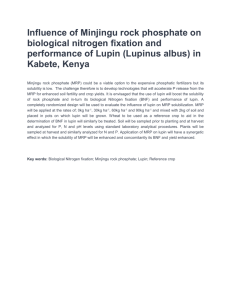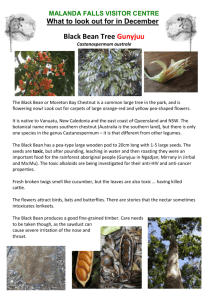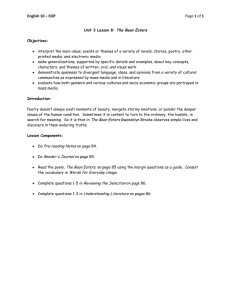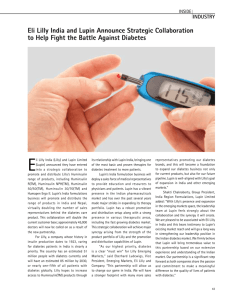Lupin cultivation in Finland
advertisement
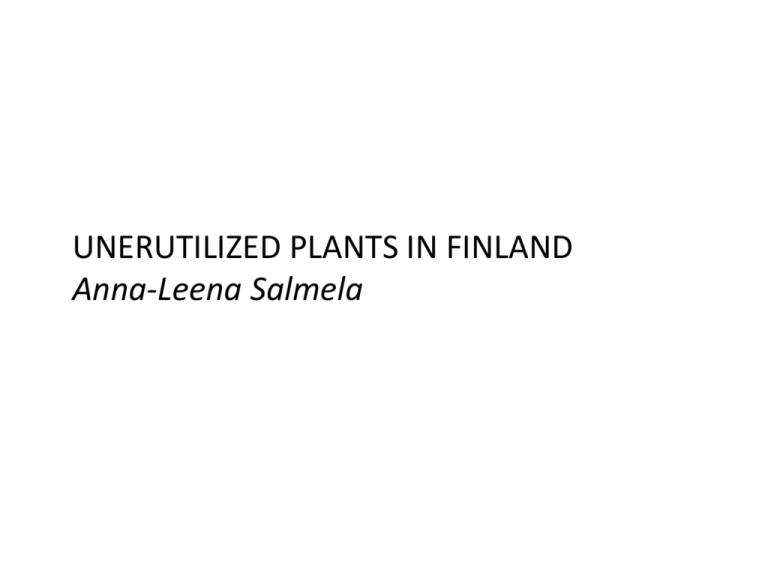
UNERUTILIZED PLANTS IN FINLAND Anna-Leena Salmela LUPINES • Lupinus is a large genus with >200 species, four species (L. albus, L. angustifolius, L. luteus, L. mutabilis) are suitable for cultivation as high protein crops • Sweet lupin vs bitter lupin • Wild-growing lupines not suitable for animal feed or human consumption due to poisonous alkaloids (bitter) • Breeding has resulted in low alkaloid variants (sweet lupines) • Lupines belong to legumes • Peanut • Peas • Beans • Soy • Lupines • Lupines have a long history in human nutrition: seeds were very popular with the Romans, in the Incan empire, and are nowadays commonly used in Greece, Portugal, Italy, Egypt and Brazil • 50 % of people allergic to peanut are also allergic to lupine Lupin cultivation in Finland • Species: Lupinus angustifolius (Blue lupine), Lupinus luteus (yellow lupine) and Lupinus albus (white lupine) • Significance: Finland is dependent on exported protein source in animal feed. Together with peas and fava beans lupines are potential alternative protein source for exported ones (soy) Can be also used as a component of healthy human diet (high fibre and protein content) - only blue lupin cultivated for human consumption in Finland, 1 farm Wild-growing lupins contain poisonous alkaloids • Lupin cultivation area: in 2010 85 ha, in 2011 92 ha Images from wikipedia Lupin cultivation in Finland Lupinus angustifolius - Blue lupine, Australian lupin, Australian sweet lupin, bitter lupin, European blue lupine, lupin, narrow leaf lupin, New Zealand blue lupin, sweet lupinseed • Native to northern Africa (i.e. Algeria, Egypt and Morocco), southern Europe (i.e. Bulgaria, Greece, Italy, France, Portugal and Spain), western Asia (i.e. Cyprus, Israel, Lebanon, western Syria and Turkey) • Due to its roots entering deep in the ground, does not require strong fertilization • Blue or white flowers • Haags Blaue lupin is cultivated in Finland by appr. 10 farmers • Successfully cultivated only for a couple of years • Interest in using blue lupin as an alternative protein source in animal feed and also part of a healthy diet. In Finland, only 1 farm cultivating blue lupin for human consumption • Challenges in using blue lupin in chicken feed - amount of suphur-containing amino acids is low - high fibre content Lupin cultivation in Finland • Digestibility trials by MTT Agrifood Research Finland in early 2000: low compared to fava beans and pea, decreased egg production when used > 15% • Together with recent results (2011) suggest that blue lupin (< 16%) can be used as a chicken feed without hampering egg production. • Slow digestibility of protein and fibre makes blue lupin excellent feed for ruminants. • University of Helsinki (prof. Aila Vanhatalo) Investigation of legumes (blue lupin and fava beans) as ruminant feed • Underutilized plants – development project by Satafood Kehittämiskeskus ry in 2007 – 2012 Blue lupin in human diet • Only seeds can be used for nutritional purposes • Use in human nutrition is in early stages in Finland • High protein content (over 30 % in the bean) • High levels of fibre (polygalactan) • Low levels of starch • Oleic acid • Is a potential allergen Health effects • Short chain amino acids reduce blood pressure and cholesterol Lupin in human nutrition in Finland • Only one company, Palkuainen in Lammi, makes lupin-based products (commercial production since 2012) • Uses blue lupin Haags blaue cultivated in Lapua • Lupin tempe (usually from soy) http://www.tempe.fi/ • Also interested in developing lupin-based ice-cream and youghurt • • • Lupin flour is imported - Mild taste, can be used to replace egg, extends shelf life, improves nutritional values - Used in bread, cakes, ice-cream, commonly in gluten free products Also imported products available, sold in eco stores Lupin has to be marked in packaging labels (since 2009). Lupin ice-cream and vegan meat alternatives in the market in Germany Potential health effects of blue lupine Effects on • serum lipids • cholesterol • faecal microbiota • blood pressure • glycemic response • satiety, food intake • bowel function • risk factors of colon cancer Health effects of blue lupine (Pubmed) Bartkiene E et al. Effect of lactic acid fermentation of lupine wholemeal on acrylamide content and quality characteristics of wheat-lupine bread. Int J Food Sci Nutr. 2013 Nov;64(7):890-6. Sirtori CR et al. Hypocholesterolaemic effects of lupin protein and pea protein/fibre combinations in moderately hypercholesterolaemic individuals. Br J Nutr. 2012 Apr;107(8):1176-83. Hall RS et al. Liking of health-functional foods containing lupin kernel fibre following repeated consumption in a dietary intervention setting. Appetite. 2010 Oct;55(2):232-7. Hodgson JM et al. Effects of increasing dietary protein and fibre intake with lupin on body weight and composition and blood lipids in overweight men and women. Int J Obes (Lond). 2010 Jun;34(6):1086-94. Lee YP et al. Effects of lupin kernel flour-enriched bread on blood pressure: a controlled intervention study. Am J Clin Nutr. 2009 Mar;89(3):766-72. Johnson SK et al. Lupin kernel fibre foods improve bowel function and beneficially modify some putative faecal risk factors for colon cancer in men. Br J Nutr. 2006 Feb;95(2):372-8. Smith SC et al. Lupin kernel fiber consumption modifies fecal microbiota in healthy men as determined by rRNA gene fluorescent in situ hybridization. Eur J Nutr. 2006 Sep;45(6):335-41. Hall RS et al. Lupin kernel fibre-enriched foods beneficially modify serum lipids in men. Eur J Clin Nutr. 2005 Mar;59(3):325-33. Archer BJ et al. Effect of fat replacement by inulin or lupin-kernel fibre on sausage patty acceptability, post-meal perceptions of satiety and food intake in men. Br J Nutr. 2004 Apr;91(4):591-9. Warren JM et al. Low glycemic index breakfasts and reduced food intake in preadolescent children. Pediatrics. 2003 Nov;112(5):e414. Dove ER et al. Lupin and soya reduce glycaemia acutely in type 2 diabetes. Br J Nutr. 2011 Oct;106(7):1045-51. Yang X et al. The effects of a lupin-enriched diet on oxidative stress and factors influencing vascular function in overweight subjects. Antioxid Redox Signal. 2010 Nov 15;13(10):1517-24. Lupin in Peru – partially based on the presentation of Gladys Tarazona R. in Turku 2011 Nomenclature Lupinus mutabilis Quechua: tarwi Aymara: tauri Spanish: altramuz (Spain), chocho (Ecuador), tarhui (Southern Peru, Bolivia), chuchus muti (Bolivia) English: tarwi, pearl lupin, Andean lupine Finnish: tuoksulupiini http://en.wikipedia.org/wiki/Lupinus_mutabilis Significance • grown mainly for its edible bean • planting started by Incas over 1500 years ago • a significant source of protein • of great importance in Peru, Bolivia, Ecuador and Chile • together with corn, potatoes and quinoa a dietary base of the ancient Andean cultures Growth conditions • grown at cool climates in valleys at high altitudes • at altitudes ranging from 800 to 3000 m • withstands drought • only mature plants frost resistant Lupinus mutabilis in nutrition • Status has changed from “peasant” food to premium food • > 40% protein • Rich in lysine • Low in cysteine and metionine • 20% fat, of high quality • Oleic acid • Linoleic acid (omega-6, essential) • Used as vegetable oil, and alternative for animal protein • Seeds consumed in soups, stews, salads etc, or grained into flour • High content of alkaloids, several processes for removal before consumption • Soaking • Cooking for 1 to 2 hours • Washing, removal of bitterness A literature search in Pubmed (Sept 2014) Appr. 20 publications on Lupinus mutabilis was found 5 papers concerning health effects Protein quality and oil digestibility (1983) . Lopez de Romaãna G et al. Protein quality and oil digestibility of Lupinus mutabilis: metabolic studies in children. J Nutr. 1983 Apr;113(4):773-8 Hypoglycemic effects (2012, 2009) Baldeón ME et al. Hypoglycemic effect of cooked Lupinus mutabilis and its purified alkaloids in subjects with type-2 diabetes. Nutr Hosp. 2012 Jul-Aug;27(4):1261-6. Fornasini M. et al. Hypoglycemic effect of Lupinus mutabilis in healthy volunteers and subjects with dysglycemia. Nutr Hosp. 2012 Mar-Apr;27(2):425-33. Ranilla LG et al. Evaluation of indigenous grains from the Peruvian Andean region for antidiabetes and antihypertension potential using in vitro methods. J Med Food. 2009 Aug;12(4):704-13. Antihypertensive effects (2009) Ranilla LG et al. Evaluation of indigenous grains from the Peruvian Andean region for antidiabetes and antihypertension potential using in vitro methods. J Med Food. 2009 Aug;12(4):704-13. Article ”Underutilized species – Policies and strategies Underutilized crops in Peru: some conceptual and political considerations” (2006) By Santiago P, Fuentealba B and Ruiz M Analysis of 391 scientific articles on underutilized Peruvian plants published in 1995 – 2006 in the National Library of Agriculture, as well as the documents of the main National Improvement Programmes developed by the National Institute for Agrarian Research and Development (INIA), UNALM and other state universities in inland Peru. They found 45 publications on tarwi/chocho (greatest number of the publications on the underutilized crops discussed in the study) Most publications on the underutilized plants discussed in the study were - on the agricultural aspects (19%) - only 5% on biochemical characterization (including nutritional contents) HEMP Hemp in Finland • During 90’s, first hemp variety that produced seeds (Finola) was developed. • In 2003, support from EU for cultivating Finola started. • Suspended in 2006 due to too high THC concentrations. • In 2011, EU support for Finola cultivation was continued in Finland and in 2013, support for oil hemp cultivation concerned the whole EU area. • Lots of interest in Finola also abroad. • Cultivation area for hemp almost 190 ha, majority being oil hemp (2012) http://yle.fi/uutiset/hamppu_haastaa_perinteiset_oljykasvit/5397599 Hemp in nutrition • • • • • • All essential amino acids High quality fat: 80 % PUFA, omega-6:omega-6 2:1, GLA, stearic acid Vitamin E Cholesterol-free Easy to use (no cooking) Potential as egg replacer, for vegetarians alternative protein source to soy • Clinical evidence on hemp seed oil in athopy (Kuopio) Efficacy of dietary hempseed oil in patients with atopic dermatitis. Callaway J, Schwab U, Harvima I, Halonen P, Mykkänen O, Hyvönen P, Järvinen T. J Dermatolog Treat. 2005 Apr;16(2):87-94. • Clinical evidence on serum lipids, cholesterol and haemostatic factors (Kuopio) Eur J Nutr. 2006 Dec;45(8):470-7. Effects of hempseed and flaxseed oils on the profile of serum lipids, serum total and lipoprotein lipid concentrations and haemostatic factors. Schwab US1, Callaway JC, Erkkilä AT, Gynther J, Uusitupa MI, Järvinen T. • • Hemp is widely used for human consumption in many countries (seeds, pasta, bread, energy bars, spreads etc) Products of Finnish origin: hemp seed oil, hemp seeds, crushed hemp seeds, hemp chocolate Buckwheat - Fagopyrum tataricum • • • • • • • A pseudo-cereal, belongs to tatars Originates from Northern India and China To Europe in the 16th century Potassium in soil important Otherwise not much nutrients needed Sensitive to frost and drought Gives highly variable yields Buckwheat in Finland • • • • • • • • • • • • Traditions for cultivation stronger in Eastern Finland (Carelia, Savonia) Cultivated already during the Stone Age in Finland (7000 years ago)? Among the oldest cereal-like plants in Finland Was very commonly cultivated 1700 - 1850 Cultivation stopped in the 1940s due to start of nitrogen fertilization and the loss of traditional areas for cultivation in the second world war Original pink variety is very rare Displaced by the white variety Interest in buckwheat again during the last 10 years Area of cultivation increased during the last 10 years (from <800 ha in 2000 to 1300 ha in 2012) Still, import needed Nowadays more than half of buckwheat cultivated in Tampere region (Pirkanmaa) Product development has been supported by EU in two projects Buckwheat in nutrition • • • • • • • • High quality protein • lysin content higher than in most of the Finnish cereals Lots of phenolic compounds (antioxidants) Phagopyritols (D-chiro inositol, glucose metabolism, type 2 diabetes diet and prevention?) Potential in product development for healthy conscious consumers Gluten-free Protein: oat>buckwheat>rye, barley and wheat Flakes, crushed seeds, flour, macaroni, baking, porridge, blinis, side dish, pies Research projects on Buckwheat ” Terveyttä tattarista” (Health from buckwheat ) investigation • By MTT, 2003 - 2007 • Buckwheat and environment, how to increase the yields, potential of buckwheat in food development, sensory properties etc ”Tattarimaa” • By MTT, 2010 – 2013 • Increasing the competitiveness of the Pirkanmaa buckwheat cultivation area, enhance the cultivation and processing, networking Potential health effects of buckwheat • • • clinical post-prandial response of selected gastrointestinal satiety hormones glycaemic and C-peptide responses serum levels of myeloperoxidase and cholesterol • • • • In vivo cognition and memory function in an in vivo Alzheimer model oxidative status and blood pressure parameters in hypertensive rats cholesterol metabolism in rats and mice fed cholesterol-enriched diet lipid metabolism and aorta histopathology in rats fed an obesogenic diet In vitro • cell cycle and viability of cancer cells • growth and cell viability of the probiotic strains in synbiotic fermented milk Research on health effects in vitro Effects of tatariside G isolated from Fagopyrum tataricum roots on apoptosis in human cervical cancer HeLa cells. Li Y et al. Molecules. 2014 Jul 29;19(8):11145-59. Flavonoids from tartary buckwheat induce G2/M cell cycle arrest and apoptosis in human hepatoma HepG2 cells. Li Y et al. Acta Biochim Biophys Sin (Shanghai). 2014 Jun;46(6):460-70. doi: 10.1093/abbs/gmu023. Epub 2014 Apr 22. Effect of buckwheat flour and oat bran on growth and cell viability of the probiotic strains Lactobacillus rhamnosus IMC 501®, Lactobacillus paracasei IMC 502® and their combination SYNBIO®, in synbiotic fermented milk. Coman MM et al. Int J Food Microbiol. 2013 Oct 15;167(2):261-8. Antigenotoxic effect of Tartary (Fagopyrum tataricum) and common (Fagopyrum esculentum) buckwheat flour. Vogrinčič M et al. J Med Food. 2013 Oct;16(10):944-52. doi: 10.1089/jmf.2012.0266. Epub 2013 Oct 1. In vivo Tartary buckwheat improves cognition and memory function in an in vivo amyloid-β-induced Alzheimer model. Choi JY et al. Food Chem Toxicol. 2013 Mar;53:105-11. doi: 10.1016/j.fct.2012.11.002. Epub 2012 Nov 28. A new "functional" pasta containing tartary buckwheat sprouts as an ingredient improves the oxidative status and normalizes some blood pressure parameters in spontaneously hypertensive rats. Merendino N et al. Food Funct. 2014 May;5(5):1017-26. Preparation of tartary buckwheat protein product and its improving effect on cholesterol metabolism in rats and mice fed cholesterol-enriched diet. Tomotake H et al. J Food Sci. 2007 Sep;72(7):S528-33. Hypolipidemic and antioxidant effects of buckwheat leaf and flower mixture in hyperlipidemic rats. Ðurendić-Brenesel M et al. Bosn J Basic Med Sci. 2013 May;13(2):100-8. Effect of adlay, buckwheat and barley on lipid metabolism and aorta histopathology in rats fed an obesogenic diet. Son BK et al. Ann Nutr Metab. 2008;52(3):181-7. clinical Consumption of buckwheat modulates the post-prandial response of selected gastrointestinal satiety hormones in individuals with type 2 diabetes mellitus. Stringer DM et al. Metabolism. 2013 Jul;62(7):1021-31. The glycaemic and C-peptide responses of foods rich in dietary fibre from oat, buckwheat and lingonberry. Rokka S et al. Int J Food Sci Nutr. 2013 Aug;64(5):528-34. Eating buckwheat cookies is associated with the reduction in serum levels of myeloperoxidase and cholesterol: a double blind crossover study in day-care centre staffs. Wieslander G et al. Tohoku J Exp Med. 2011;225(2):123-30. Other examples Development of gluten-free bread using tartary buckwheat and chia flour rich in flavonoids and omega-3 fatty acids as ingredients. Costantini L et al. Food Chem. 2014 Dec 15;165:232-40. The content of fagopyrin and polyphenols in common and tartary buckwheat sprouts. Kreft S et al. Acta Pharm. 2013 Dec;63(4):553-60. Buckwheat - an old crop with new health prospects. Keskitalo, M. et al. 2007 NJF Seminar 399 : Beneficial health substances from berries and minor crops : how to increase their concentration in cultivated species, elimanate losses in processing and enhance dietary use, Piikkiö, Finland, 14-15 March 2007 Buckwheat allergy. Stember RH. Allergy Asthma Proc. 2006 Jul-Aug;27(4):393-5. Identification and characterization of the major allergens of buckwheat. Park JW et al. Allergy. 2000 Nov;55(11):1035-41. Tartary buckwheat improves cognition and memory function in an in vivo amyloid-β-induced Alzheimer model. Choi JY et al. Food Chem Toxicol. 2013 Mar;53:105-11. doi: 10.1016/j.fct.2012.11.002. Epub 2012 Nov 28. Antigenotoxic effect of Tartary (Fagopyrum tataricum) and common (Fagopyrum esculentum) buckwheat flour. Vogrinčič M et al. J Med Food. 2013 Oct;16(10):944-52. doi: 10.1089/jmf.2012.0266. Epub 2013 Oct 1. Preparation of tartary buckwheat protein product and its improving effect on cholesterol metabolism in rats and mice fed cholesterol-enriched diet. Tomotake H et al. J Food Sci. 2007 Sep;72(7):S528-33. Buckwheat - an old crop with new health prospects. Keskitalo, M. et al. 2007 NJF Seminar 399 : Beneficial health substances from berries and minor crops : how to increase their concentration in cultivated species, elimanate losses in processing and enhance dietary use, Piikkiö, Finland, 14-15 March 2007 Broad bean, field bean, faba bean, fava bean (Vicia faba) • Widely used in Asia and as part of Mediterranean diet • A long history of cultivation in Finland from 7th century Was a very common part of diet before potatoes and peas • 1960 – 2000: area of cultivation was very low • A strong interest in broad bean from the beginning of 2000s • Only 15% of the protein in animal feed is of Finnish origin • Attempts to decrease the dependence on imported protein sources • One of the GMO-free, Finnish alternatives for soy protein – financial support for cultivation and product development • Human consumption – plant-based protein for vegetarians and health conscious • Animal feeds; chicken and pig feeds are currently dependent on soy • Decreases the need for fertilization (N), improves structure of soil • Area for broad bean cultivation has increased to 10000 ha • Cultivated at 1000 farms, mainly in South Western Finland • MTT estimates: climate change will enable cultivation of hemp and broad bean also in Lapland in 70 years • Still 10 x increase in the area of cultivation needed for pea and broad bean to replace the imported protein sources in animal feeds Broad bean in nutrition High value carbohydrates Fibre-rich Protein-rich 1% fat Available as beans, flour, tempe Available from eco stores, farmers Studies on broad bean Broad bean (Vicia broad) consumption and Parkinson's disease. Rabey JM et al. Adv Neurol. 1993;60:681-4. Improvement of parkinsonian features correlate with high plasma levodopa values after broad bean (Vicia broad) consumption. Rabey JM et al. J Neurol Neurosurg Psychiatry. 1992 Aug;55(8):725-7. Thesis work at Seinäjoki University of Applied Scieces. 2014. http://www.theseus.fi/bitstream/handle/10024/70122/Rankila_Marjo.pdf?sequence=1 ”Härkäpapu kotimaisen kasvivalkuaisen lähteenä. Härkäpaputuotteiden tuotekehitys” (Fava bean as a plant protein source. Product development.) - broad bean patties, broad bean – blueberry beverage http://www.hs.fi/kotimaa/a1400564802038 20.5.2014 University of Helsinki, Food Technology department in Viikki • Research on broad bean in product development 2012 - 2014 • Broad bean yoghurt • Challenges: strong bean like aroma, harmful substances (visine, convisine causing anemia in a subgroup of people) • Only beans without harmful substances and unwanted aroma needed to attract companies for product development • Possible removal processes for convicine and vicine: heating, fermenting • Very interesting alternative for imported soy • Research on fermentation still continuing Studies on broad bean Broad bean (Vicia broad) consumption and Parkinson's disease. Rabey JM et al. Adv Neurol. 1993;60:681-4. Improvement of parkinsonian features correlate with high plasma levodopa values after broad bean (Vicia broad) consumption. Rabey JM et al. J Neurol Neurosurg Psychiatry. 1992 Aug;55(8):725-7. Thesis work at Seinäjoki University of Applied Scieces. 2014. http://www.theseus.fi/bitstream/handle/10024/70122/Rankila_Marjo.pdf?sequence=1 ”Härkäpapu kotimaisen kasvivalkuaisen lähteenä. Härkäpaputuotteiden tuotekehitys” (Fava bean as a plant protein source. Product development.) - broad bean patties, broad bean – blueberry beverage http://www.hs.fi/kotimaa/a1400564802038 20.5.2014 University of Helsinki, Food Technology department in Viikki • Research on broad bean in product development 2012 - 2014 • Products developed: Broad bean yoghurt • Challenges: strong bean like aroma, harmful substances (visine, convisine causing anemia in a subgroup of people) • Only beans without harmful substances and unwanted aroma needed to attract companies for product development • Possible removal processes for convicine and vicine: heating, fermenting • Very interesting alternative for imported soy • Research on fermentation still continuing
